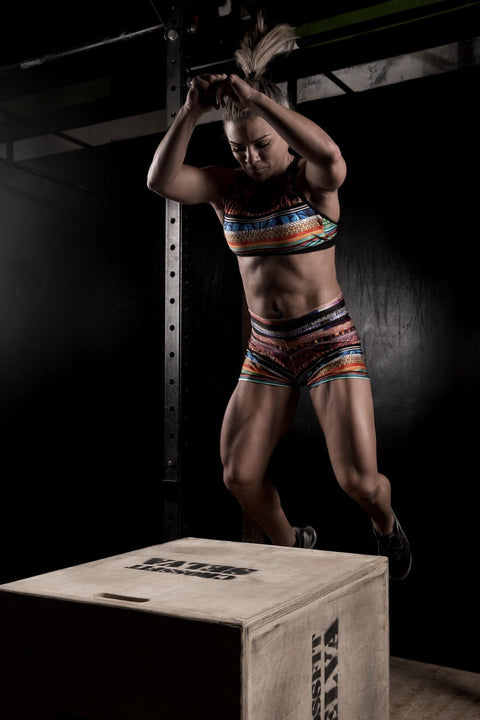Disclaimer:
The information provided in this blog post is for educational purposes only and is not intended as professional advice. Please consult with a certified fitness trainer or healthcare provider before making significant changes to your exercise routine.
Athletes train with purpose, discipline, and intensity. They focus on building strength, endurance, mobility, and mental toughness—all of which can benefit anyone, not just those competing at a high level. If you want to level up your fitness routine and train like an athlete, here’s how you can incorporate key principles into your workouts.
1. Train with a Goal in Mind
Athletes don’t work out just for the sake of it—they train with a goal. Whether it's improving speed, increasing endurance, or building explosive power, their workouts are intentional.
Actionable Tip: Set clear, measurable goals for your training. Instead of just “getting fit,” aim to increase your squat by 20 pounds, shave a minute off your mile time, or hold a plank for three minutes.
2. Prioritize Strength Training
Strength is the foundation of athletic performance. Whether you’re a sprinter, a basketball player, or a swimmer, building muscle strength helps improve power, endurance, and injury prevention.
Key Exercises:
- Squats
- Deadlifts
- Bench Press
- Pull-Ups
- Power Cleans (for explosive strength)
Actionable Tip: Train compound movements three to four times per week, focusing on progressive overload (gradually increasing weight or reps).
3. Incorporate Functional Movements
Athletes don’t just lift weights; they train for real-life movements. Functional exercises improve coordination, balance, and agility—key elements for performance.
Best Functional Exercises:
- Kettlebell Swings (explosiveness)
- Sled Pushes (full-body power)
- Box Jumps (plyometrics)
- Battle Ropes (endurance and grip strength)
- Farmer’s Walks (core stability)
Actionable Tip: Add at least two functional movement exercises to your routine each week.
4. Develop Explosiveness with Plyometrics
Athletes need speed and power. Plyometric training (jump training) builds fast-twitch muscle fibers, improving your ability to generate force quickly.
Explosive Moves to Try:
- Jump Squats
- Broad Jumps
- Medicine Ball Slams
- Lateral Bounds
- Sprint Intervals
Actionable Tip: Add plyometric drills one to two times per week for explosive speed and agility.
5. Improve Your Cardiovascular Endurance
Athletic performance requires stamina. Whether you're a runner, weightlifter, or casual gym-goer, better endurance helps you perform longer without fatigue.
Top Conditioning Workouts:
- Sprint Intervals (10-15 second sprint, 45 second rest)
- Rowing Machine (one-minute max effort, one-minute rest)
- Assault Bike (30 second sprint, 30 second rest x 10)
- Jump Rope (five to ten minutes non-stop)
Actionable Tip: Add high-intensity cardio two to three times per week to build endurance.
6. Prioritize Mobility and Flexibility
Athletes don’t just train hard; they train smart. Stretching and mobility work reduce injury risk and improve overall movement efficiency.
Essential Mobility Drills:
- Hip Openers (for squats and agility)
- Shoulder Mobility Drills (for pressing and overhead movements)
- Thoracic Spine Rotations (for rotational sports and core stability)
- Foam Rolling (to aid muscle recovery)
Actionable Tip: Spend at least ten minutes daily on stretching and mobility drills.
7. Train Your Mind Like an Athlete
Athletic performance isn’t just physical—it’s mental. Developing resilience, focus, and discipline separates top athletes from the rest.
Mental Training Tips:
- Visualize success before a workout
- Set small daily goals and track progress
- Push through discomfort but know when to rest
- Use breathing techniques for focus and recovery
Actionable Tip: Try visualization before your workouts—picture yourself completing a lift or finishing a sprint with power and confidence.
8. Prioritize Recovery Like a Pro
Recovery is just as important as training. Athletes optimize their recovery to perform at their best every day.
Key Recovery Strategies:
- Get seven to nine hours of quality sleep
- Use active recovery (light movement on rest days)
- Fuel your body with proper nutrition
- Use contrast therapy (hot/cold exposure)
Actionable Tip: Treat sleep like training—make it non-negotiable. Aim for at least seven hours per night.
Final Thoughts: Train Like an Athlete, Live Like a Champion
You don’t have to compete in sports to train with an athletic mindset. By adopting an athlete’s approach—goal setting, strength and conditioning, functional movement, recovery, and mental toughness—you’ll see massive improvements in your fitness and overall well-being.
Now it's your turn! What’s one area you’ll focus on this week? Let me know in the comments.




